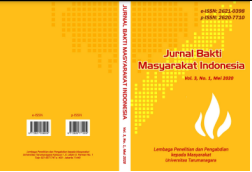IMPLEMENTASI WORK PASSION MELALUI MODAL PSIKOLOGI PADA KADER MASYARAKAT DESA CIAPUS, CIOMAS, BOGOR
Main Article Content
Abstract
The results of the analysis of the problems of village cadres that have been fostered by the Association of Ambissi, seem still and need to be developed in terms of psychological aspects. They are enthusiastic about the activities that have been carried out but not yet wholeheartedly to develop their activities. Therefore, Community Village Cadre Assistance in Ciapus Village, Ciomas Subdistrict, Bogor Regency has the following objectives: (1) Village cadres know their abilities in terms of psychological capital. (2) Village cadres want to increase their enthusiasm for work so that they can excel in every activity. (3) Village cadres are able to develop activities based on the work plan they have made. The training method using the model of individual behavior change from Kurt Lewin is using unfreezing, change and refreezing conditions. In accordance with the training method the unfreezing stage consists of group sessions; role session as village cadre; the change stage consists of individual target sessions (2 rounds); target group session; the refreezing stage consists of 3-month work target sessions and Psychology Capital sessions by filling out a questionnaire. Results and discussion of the types of participants in setting targets, (1) participants who know their abilities, but they are trying to achieve the target of reaching all balls; (2) participants who already know their abilities but are not satisfied; (3) participants who want to know their abilities; (4) participants who are looking for safety; (5) participants are aware of the risk so that it becomes realistic. The results of the Psychology Capital questionnaire, in general, village cadres have an optimistic attitude that is always a part of him and doesn't know to give up if there are difficulties always think about how to solve them. But that still needs to be improved on the aspects of hope, self-efficacy and resilience. The conclusion of the training objectives is reached in terms of cognitive and affective and it is suggested to continue to examine the behavior
ABSTRAK:
Hasil analisis permasalahan para kader desa yang telah dibina oleh Perkumpulan Ambissi, kelihatan masih dan perlu dikembangkan dari sisi aspek-aspek psikologi. Mereka bersemangat dengan kegiatan-kegiatan yang telah dilakukan tapi belum sepenuh hati untuk mengembangkan kegiatannya. Oleh karena itu, Pendampingan Kader Desa Masyarakat Di Desa Ciapus, Kecamatan Ciomas, Kabupaten Bogor mempunyai tujuan (1) Para kader desa mengetahui kemampuan yang dimilikinya ditinjau dari modal psikologi. (2) Para kader desa mau meningkatkan gairah kerja sehingga berprestasi di setiap kegiatan. (3) Para kader desa mampu mengembangkan kegiatan berdasarkan rencana kerja yang dibuatnya. Metode pelatihan dengan menggunakan model perubahan perilaku individu dari Kurt Lewin yaitu menggunakan kondisi unfrrezing, change dan refreezing. Sesuai dengan metode pelatihan pada tahap unfreezing terdiri dari sesi berkelompok; sesi peran sebagai kader desa; tahap change terdiri dari sesi target individual (2 ronde); sesi target kelompok; tahap refreezing terdiri dari sesi target kerja 3 bulan dan sesi Modal Psikologi dengan mengisi kuesioner. Hasil dan pembahasan tipe peserta dalam menetapkan target yaitu (1) peserta yang tahu akan kemampuan dirinya, namun mereka berusaha agar target tercapainya tercapai yaitu bola masuk semua; (2) peserta yang sudah tahu kemampaun dirinya tapi merasa tidak puas; (3) peserta yang ingin tahu kemampuan dirinya; (4) peserta yang mencari aman; (5) peserta yang menyadari risiko, sehingga menjadi realistis. Hasil kuesioner isian kuesioner Modal Psikologi, pada umumnya para kader desa memiliki sikap optimis yang selalu menjadi bagian dirinya dan tidak kenal menyerah jika ada kesulitan selalu dipikirkan cara menyelesaikannya. Namun yang masih perlu ditingkakan pada aspek hope, self efficacy dan resilensi. Kesimpulan tujuan pelatihan tercapai dari sisi kognitif dan afektif dan disarankan dilanjutkan untuk menelaah dari perilaku.
Article Details
This work is licensed under a Jurnal Bakti Masyarakat Indonesia https://creativecommons.org/licenses/by-nc-sa/4.0/
References
Birkeland, I.K., Buch, R. (2015). The dualistic model of passion for work: descriminate and predictive validity with work engagement and workaholism. Motivation and Emotion, 39 (3), 392-408.
Cetin, F., Basim, H.N. (2012). Organizational psychological capital : a scale adaptation sudy. Todaie’s Review of Public Administration, 6(1), 159-179.
Donahue, E.G, Forest, J.,Vallerand, R.J. (2012). Passion for work and emotional exhaustion : the mediating role of rumination and recovery. Applied Psychology : health and well-being, 4(3), 431-368.
Hagel, J., Brown, J.S., Ranjan, A., Byler, D. (2014). Passion at work: cultivating worker passion as a cornerstone of talent development. Deloitte University Press. Diambil dari : https://dupress.deloitte.com/dup-us-en/topics/talent/worker-passion-employee- behavior.html
Luthans, F.,Yoessef-Morgan, C.M, Avolio, B.J. (2015). Psychological capital and beyond. USA: Oxford University Press.
Ryan, R.M., Deci, E.L. (2000). Self-determination theory and the facilitation of intrinsic motivation, social development and well-being. American Psychological Association, 55(1), 68-78.
Ryan, R.M., Deci, E.L. (2017). Self determination theory, basic psychological needs in motivation, development, and wellness. New York:The Guilford Press.
Sunarsihanto, Pambudi. (2015). Talent Harus Mampu Hadapi VUCA World. Human Capital Journal. Diambil dari: http://humancapitaljournal.com/pambudi-sunarsihanto- talent-harus-mampu-hadapi-vuca-world/
Vallerand, R.J., et al (2003). Les passion de l^ame : on obessive and harmonius passion. Journal of Personality and Social Psychology, 85(4), 756-767.
Vallerand, R.J.(2012). The role of passion in sustainable psychological well-being. Psychology of Well Being, a Springer Open Journal, 2:1. Diambil dari : http://www.psywb.com/content/2/1/1.
Zigarmi, D., Nimon, K.,Houson, D.,Witt, D.,Diehl, J. (2011). A preliminary field test of an employee work passion model. Human Resources Development Quarterly, 12(2), 195- 221.
Zhao, Y., St-Louis, A., Vallerand, R.J.(2015). On the validation of the passion scale in chinese. Psychology of Well Being, A Springer Open Jounal, 5(3).
http://www.tribunnews.com/kemenko-pmk/2018/10/26/peran-revolusi-mental-sebagai- lokomotif-perubahan-indonesia?page=2. Jumat, 26 Oktober 2018 14:46 WIB


